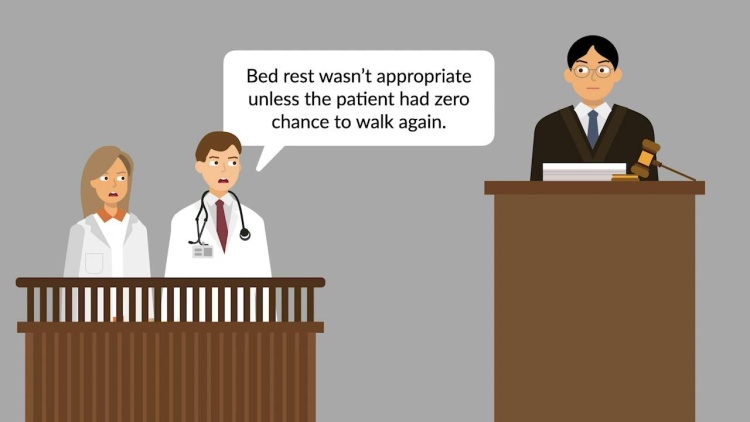Matthies v. Mastromonaco
Supreme Court of New Jersey
733 A.2d 456 (1999)
- Written by Mary Pfotenhauer, JD
Facts
Matthies (plaintiff) broke her right hip and was treated by Dr. Mastromonaco (defendant), an orthopedic surgeon. Dr. Mastromonaco prescribed bed rest instead of surgical placement of steel screws, based on Matthies’ age, frail condition, osteoporosis, the probability of severe pain, and his belief that bed rest could restore Matthies’ right leg to a limited level of function. Matthies’ expert testified that bed rest was inappropriate unless the patient did not expect to walk again, and that this treatment carried a risk that the fracture could dislocate, which is what happened to Matthies. Before the accident, Matthies lived independently and was relatively mobile. After her fall, her prescribed bed rest, and the displacement of her right femur, Matthies was not able to walk again and was confined to a nursing home. Matthies brought claims against Dr. Mastromonaco for malpractice and for failure to give informed consent, claiming that she would not have consented to bed rest if she had been informed of the risk to her quality of life. The trial court dismissed the informed consent claim because the treatment was non-invasive, and because the claim was subsumed in Matthies’ negligence claim. The jury found for Dr. Mastromonaco on the malpractice claim. The Appellate Division reversed, based on the trial court’s failure to inform the jury on the informed consent claim.
Rule of Law
Issue
Holding and Reasoning (Pollock, J.)
What to do next…
Here's why 907,000 law students have relied on our case briefs:
- Written by law professors and practitioners, not other law students. 47,100 briefs, keyed to 996 casebooks. Top-notch customer support.
- The right amount of information, includes the facts, issues, rule of law, holding and reasoning, and any concurrences and dissents.
- Access in your classes, works on your mobile and tablet. Massive library of related video lessons and high quality multiple-choice questions.
- Easy to use, uniform format for every case brief. Written in plain English, not in legalese. Our briefs summarize and simplify; they don’t just repeat the court’s language.





